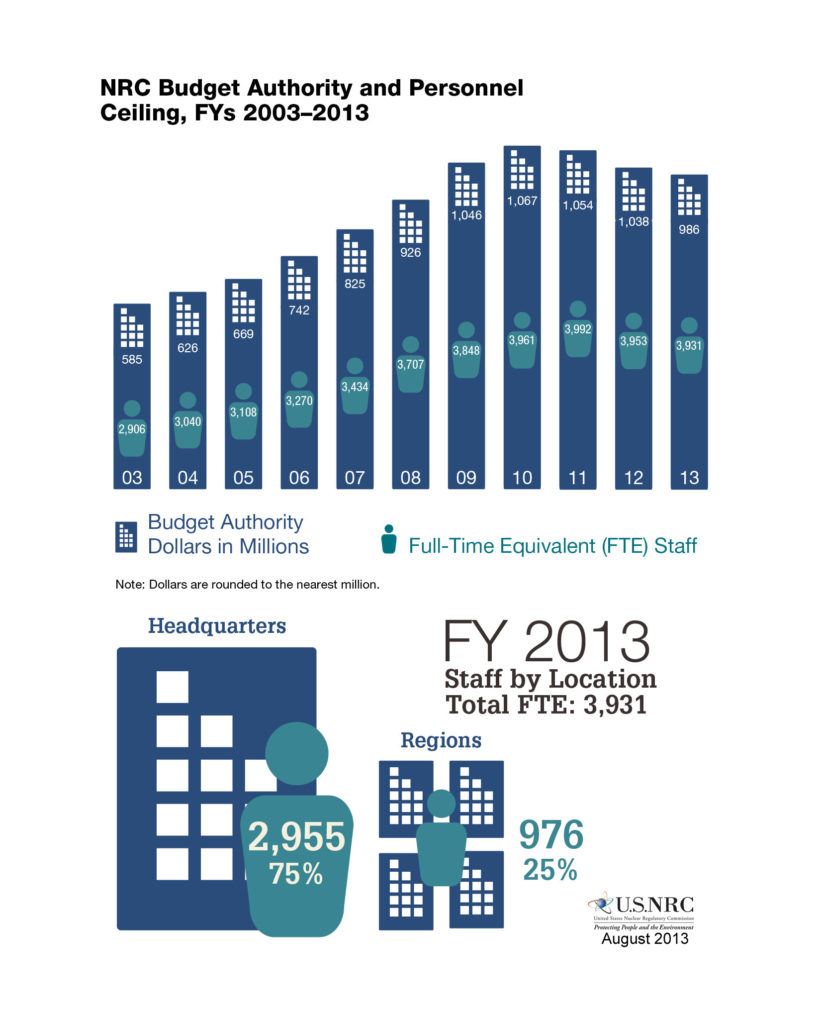Nuclear Energy Activist Toolkit #27
The Nuclear Regulatory Commission (NRC) has at least two inspectors assigned full-time to each operating nuclear plant in the United States. The efforts by these resident inspectors are supplemented by inspectors from the agency’s regional and headquarters offices.
When plant owners apply to the NRC to renew reactor operating licenses for up to 20 more years and operate reactors at higher power levels, NRC staff review the requests to determine whether they can be approved.
Other NRC staff conduct research of known and potential problems as well as possible solutions.
Who pays for the NRC?
For the most part, it’s not the American taxpayer. A federal law passed in 1990 requires about 90 percent of the NRC’s budget to come from fees charged to those regulated by the agency.
In other words, the plant owners pay for the NRC’s resident inspectors, regional inspectors, headquarters inspectors, researchers, and mangers. And think what you will about the NRC—they don’t come cheap.
In 2013, the NRC’s budget was $986,000,000 for its staff of 3,931.
Each year, the NRC proposes a budget to the Congress. Some years, the Congress approves the budget. The NRC then divides the approved budget by the number of licensees to determine the fees to be charged.
In 2013, the NRC invoiced the owner of each operating reactor $4,390,000. Thus, the Tennessee Valley Authority, owner of the three reactors operating at its Browns Ferry nuclear plant in Alabama, paid $13,170,000. Owners of each operating reactor pay over $500 per hour 24/7 for the NRC’s basic service.
But what about the four reactors (Crystal River 3, Kewaunee, and San Onofre Units 2 and 3) that permanently shut down last year? Because they receive less NRC time and attention, their owners pay lower fees: only $231,000 per permanently shut down reactor.
Extras Cost Extra
These fees entitle owners to basic NRC service. You want extra NRC service, you have to pay extra.
When an owner submits a request to the NRC to renew a reactor operating license for 20 more years, the NRC will review that request, at the modest rate of $272 per hour.
When declining performance levels at a plant compel the NRC to dispatch additional inspectors, the NRC invoices the owner for this “extra” service. As the range of NRC inspection hours per reactor during 2012 shows, owners have safety and financial reasons to prevent performance levels from declining at their nuclear plants.
Fuller details about the NRC’s Fiscal Year 2014 budget can be found in their request to the Congress.
Bottom Line
Ratepayers rather than taxpayers pay nearly 90 percent of the NRC’s budget. A difference without much distinction since the dollars all come from Americans’ pockets.
The UCS Nuclear Energy Activist Toolkit (NEAT) is a series of post intended to help citizens understand nuclear technology and the Nuclear Regulatory Commission’s processes for overseeing nuclear plant safety.


